Theory Research
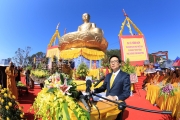
Religious policies in the socialist law-ruled State of Vietnam
(LLCT) - Do religions have a place in the law-ruled state? In Vietnam, for religions and the socialist law-ruled State get on with each other and conform to the United Nations’ declarations on human and civil rights, how should the State implement its religious policies? The following article answers these questions.
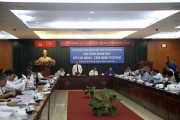
Ho Chi Minh - A statesman of great vision
(LLCT) - In celebration of the 105th anniversary of the day Ho Chi Minh left Vietnam to seek ways for national salvation (5 June 1911 - 5 June 2016), Ho Chi Minh National Academy of Politics in coordination with the Ho Chi Minh City Party Committee organized the symposium “Ho Chi Minh - A statesman of great vision” in Ho Chi Minh City. The Journal would like to publish extracts of the keynote speech by Professor and Doctor Nguyen Xuan Thang, Member of the Party Central Committee, and Secretary of the Party Committee and President of the Ho Chi Minh National Academy of Politics.
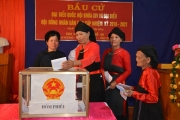
The Vietnamese State for human rights and the right of the peoples to self-determination
(LLCT) - The Democratic Republic of Vietnam (now the Socialist Republic of Vietnam), as a product of the great August Revolution, has always kept the consistent objectives defined by the Party since its establishment, which clearly affirm the Vietnamese people’s right to self-determination and the safeguarding of human rights for all. Actual history has proved that the consistency and efforts of the State have led to great achievements in ensuring human rights in Vietnam over the past 70 years.
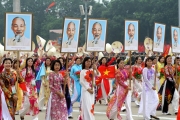
Gender dimensions in the current institutions and policies for female intellectuals
(LLCT) - The Communist Party of Vietnam always attaches great importance to the advancement of intellectuals, including female ones. In this article, female intellectuals include those who graduated from colleges and universities, now working in the fields of social sciences and humanities, science and technology, health care, education and training, literature, arts, or holding leadership and management positions.
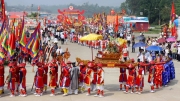
Promoting the worship of Hung Kings in national construction and defense
(LLCT) - On the occasion of the third anniversary of UNESCO’s inscription of “The Worship of Hung Kings in Phu Tho” on the Representative List of the Intangible Cultural Heritage of Humanity, the Ho Chi Minh National Academy of Politics and the Ho Chi Minh City Party Committee jointly held a seminar “The Worship of Hung Kings in Vietnam” in Ho Chi Minh City on December 26, 2015. We would like to publish parts of the keynote report and the summation of the seminar, presented by Prof., Dr. Ta Ngoc Tan, Member of the Party Central Committee and President of the Ho Chi Minh National Academy of Politics.

Cultural industries and national sustainable development
(LLCT) - Cultural industries are perceived in theory and dealt with in practice in the same way. They aim to achieve humanity and people’s advancement.

Characteristics of Vietnamese culture
(LLCT) - The historical activity of human society conforms to the nature of culture, lending it the qualities and functions of productive forces. Therefore, culture has a direct influence on nature and socio-economic building and development.
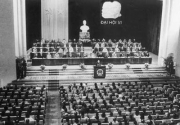
Renewal of economic thinking: A look back at 70 years
(LLCT) - Different countries have differing methods and steps of development, but in general, national governments must deal with economic regime as the most essential factor of their regimes’ stability and their countries’ respective wealth and power.
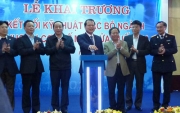
70 years of building a State of, by and for the people
(LLCT) - Over the last 70 years, Vietnamese people under the leadership of the Communist Party of Vietnam (CPV) have won great victories in the resistant wars against French and American invaders, have unified the country, have carried out the renovation and have gained historic achievements in the cause of national building and defense. The Vietnamese State has been strengthened and developed to become the socialist law-ruled State of, by, and for the people.
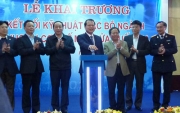
Economic restructuring in response to climate change - theory and practice
(LLCT) - Climate change poses serious impacts on every field of social and economic life, especially in developing countries. Thus, coping with climate change, mitigating its negative impacts, and co-existing with it require joint efforts and co-ordination of all nations, regions, and sectors/areas. Of note, economic restructuring in response to climate change is an appropriate and interdisciplinary solution.
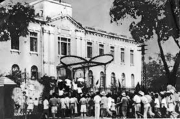
Enhancing the Party’s leadership capacity and combativeness to meet the requirements and tasks in the new period
(LLCT) - In the past 85 years, the CPV, found and trained by President Ho Chi Minh, has led Vietnamese people to carry out a prolonged and hard revolution to overcome numerous difficulties and challenges and win the great victories. The CPV successfully led the General Insurrection in August of 1945 smashing the colonialist and feudalist yoke to establish the Democratic Republic of Vietnam.
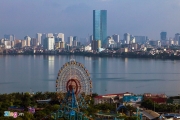
The theoretical achievements of the Communist Party of Vietnam
(LLCT) - Over the past eighty-five years, since the foundation and under the leadership of the Communist Party of Vietnam (CPV), the Vietnamese people have won many great victories of historical and epochal significance in their revolutionary cause: The success of the Revolution in August 1945 that gave birth to the Democratic Republic of Vietnam; the success of the 30-year liberation war and the wars to protect the Southwestern border and Northern border of the country; the success of the national renovation cause and the process of national construction and development.
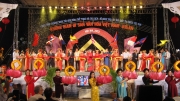
Creativeness in the Party’s foreign guideline in the renovation period
(LLCT) - One of the most striking characteristics of the renovation of the Party’s thoughts of foreign affairs was to thoroughly grasp, apply, and creatively develop Marxism - Leninism and Ho Chi Minh Thought regarding diplomacy.
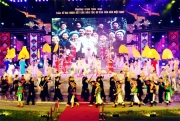
Promoting and cultivating solidarity, wisdom and discipline traditions
(LLCT) - Traditions are cultural values steadily crystallized and derived from a political, social organization, and from a community. These cultural traditions are flowing, handed down, spread and absorbed over times and are more and more preserved, promoted and cultivated.
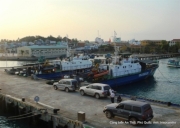
Blue marine economy: Problems and approaches for Vietnam
(LLCT) - The marine economy has significantly contributed to the country’s economy, but its development scale is so far not commensurate with the sea’s potential and values. Development of the blue marine economy is the right choice to develop rapidly, efficiently and sustainably the marine economy in the direction towards industrialization and modernization.
Journal Archives
Journal Archives
Media
Photo Gallery
Contact us

 Theory Research
Theory Research


